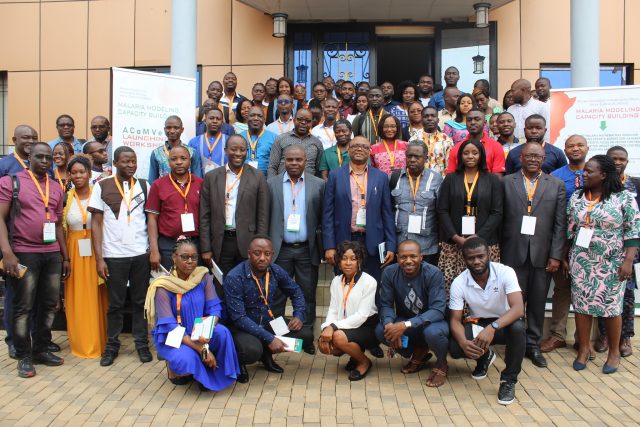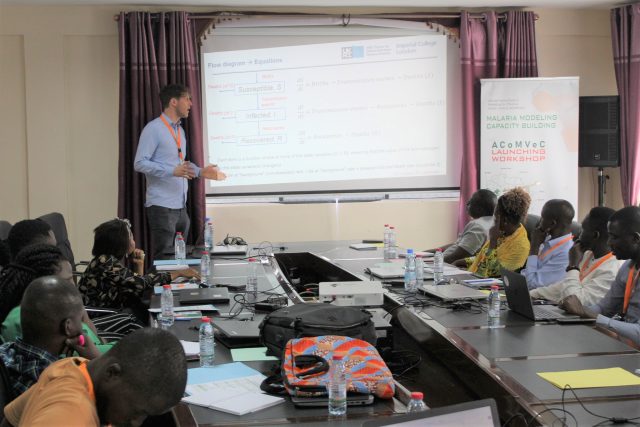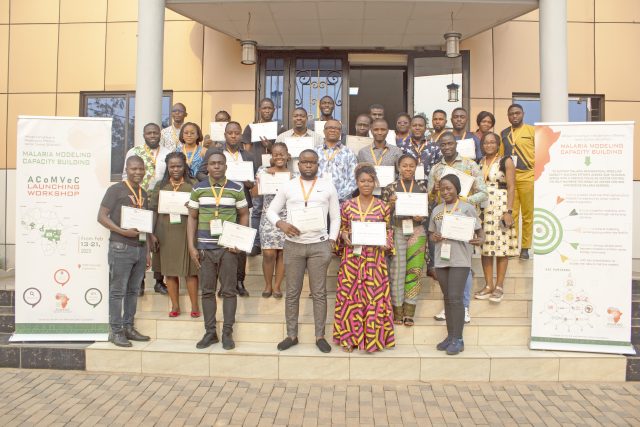
Family picture
The African Consortium in Modelling for Effective Vector Control (ACoMVeC), launching ceremony and first workshop took place on Monday, February 13th, 2023 at the Centre for Research in Infectious Diseases (CRID), Yaoundé, Cameroon. The workshop was aimed at strengthening the capacity of stakeholders in mathematical modelling for effective vector control. ACoMVeC is funded by the Bill and Melinda Gates Foundation.
A delegation from the National Malaria Control Programme (NMCP), the representatives of the Pan-African Mosquito Control Association (PAMCA)-Cameroon chapter, mathematical modellers from the United Kingdom, United States of America, and France, the Principal Investigators of the project, the academic supervisors of the 16 PhD students from 8 Africa countries (Ghana, Uganda, Malawi, Cameroon, Tanzania, Burkina Faso, DR Congo, Senegal) attended the launching ceremony. The NMCP represented by Dr Tabue Raymond and Mr Kuetche Malgloire presented the challenges of malaria vector control and the importance of data quality and management in malaria control. The stakeholders attended the presentation on the malaria situation and vector control in each country of intervention. On the same day, a cultural ceremony was organised to welcome and introduce the participants to Cameroonian culture.

Course with Prof. Thomas Churcher
Held from February 13-21, the AComVec workshop aimed at strengthening students capacity on m athematical modelling. PhD students were introduced to the concept of mathematical modelling by experts in the field such as Thomas Churcher, Professor of Infectious Disease Dynamics, Imperial College London; Dr Prashanth Selvaraj, senior research scientist, Institute for Disease Modeling at the Bill & Melinda Gates Foundation; Dr Ramses Djidjou, mathematical modeller, Institut de Recherche pour le Développement (IRD); Dr Benjamin Amoah, School of public health, Imperial College London; Prof Charles Wondji expert in genetics and infectious diseases, Liverpool School of Tropical Medicine (LSTM); Dr Trésor Melachio, Deputy Head of Department of Parasitology and Microbiology, CRID. The themes explored include the mechanics of Modelling, vector Borne Disease Models, modelling malaria control, Research methodology for modellers, and an Introduction to model-based geostatistics for disease mapping. Moreover, participants were given a guided tour of CRID to understand the research and data acquisition process. They visited the insectary and the various specialised laboratories. They also visited CRID’s experimental field stations at Elendé, Center Region where they were briefed on the process of mosquito collection and field experiments.

Family picture at the end of the worksho
The workshop ended on February 21st with closing remarks from Prof. Wondji followed by handing of certificates of participation. In his remarks, Prof Charles Wondji challenged the participants to seize the opportunity given to them to be trained and become PhD holders and experts in mathematical modelling within 3 years.
Partner institutions for this project include : Ifakara Health Institute of Tanzania (IHI), Institut de la Recherche en Science de la Santé of Burkina-Faso (IRSS), Centre Entomologique de Recherche de Formation et d’Expertise de Kimpese (CERFEK), Uganda Virus Research Institute (UVRI), Ghana Atomic Energy Commission (GAEC), and Institut de Recherche pour le Développement of France (IRD).






